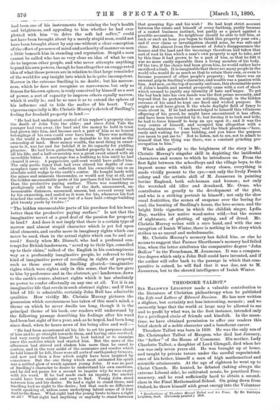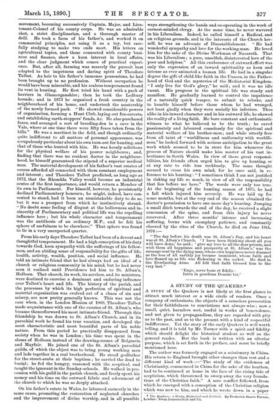THEODORE TALBOT.*
SIR BALDWYN LEIGHTON made a valuable contribution to the literature of Christian philanthropy when he published the Life and Letters of Edward Denison. He has now written a slighter, but certainly not less interesting, memoir ; and we earnestly hope that the world at large may be allowed to see and to profit by what was, in the first instance, intended only for a privileged circle of friends and kinsfolk. In the mean- time, we have obtained permission to offer our readers this brief sketch of a noble character and a beneficent career.
Theodore Talbot was born in 1839. He was the only son of Mr. Christopher Talbot of Margam, who died last January, the " father " of the House of Commons. His mother, Lady Charlotte Talbot, a daughter of Lord Glengall, died when her son was only seven years old. He was brought up at home, and taught by private tutors under the careful superintend- ence of his father, himself a man of high mathematical and scientific attainments. At the age of eighteen he went up to Christ Church. He hunted, he debated (taking always the extreme Liberal side), he cultivated music, he practised Free- masonry, and he read sufficiently hard to obtain a second- class in the Final Mathematical School. On going down from Oxford, he threw himself with great energy into the Volunteer
• Recollections of Theodore Hansel Talbot and his Time. By Sir Ealdwyn Leighton, Bart. (Privately printed-) 1839.
movement, becoming successively Captain, Major, and Lieu- tenant-Colonel of his county corps. He was an admirable shot, a strict disciplinarian, and a thorough master of drill. He took a farm of his father's, and worked it on commercial principles, not using it as a toy, but care- fully studying to make two ends meet. His letters on agricultural topics, and those connected with county busi- ness and finance, show a keen interest in local affairs, and the clear judgment which comes of practical experi- ence. But, after all, farming was scarcely the pursuit beat adapted to the impetuous and daring spirit of Theodore Talbot. As heir to his father's immense possessions, he had been brought up to no profession. Without occupation he would have been miserable, and his zealous temperament found its vent in hunting. He first tried his hand with a pack of harriers in Glamorganshire ; then he took the Ledbury hounds; and in 1873 he organised a fresh country in the neighbourhood of his home, and undertook the mastership of the newly formed pack. " He showed considerable powers of organisation, forming a Hunt Club, laying out fox-coverts, and establishing earth-stoppers' funds, &c. He also purchased foxes, and arranged a sort of breeding-den in a cave in the Vale, where at one time there were fifty foxes taken from the hills." He was a martinet in the field, and though ordinarily quite indifferent to all matters of personal appearance, was scrupulously particular about his own turn-out for hunting, and that of those who bunted with him. He was keenly solicitous for the physical welfare of his poorer neighbours; and, finding that there was no resident doctor in the neighbour. hood, he himself guaranteed the stipend of a superior medical man. The material development of his father's vast estates of course afforded all connected with them constant employment and interest ; and Theodore Talbot predicted, as long ago as 1872, that the Rhondda Valley would become an industrial centre of the first importance, and would return a Member of its own to Parliament. For himself, however, he persistently declined Parliamentary honours ; he might, indeed, have con- sented to stand, had it been an unmistakable duty to do so, but it was a prospect from which he instinctively shrank. " No doubt some feeling of disgust at the hollowness and in- sincerity of Parliamentary and political life was the repelling influence here ; but his whole character and temperament was the antithesis of an ordinary M.P., and he felt his sphere of usefulness to be elsewhere." That sphere was found to lie in a very unexpected quarter.
From his early days Theodore Talbot had been of a devout and thoughtful temperament. He had a high conception of his duty towards God, keen sympathy with the sufferings of his fellow- men, and an abiding sense of responsibility for the gifts of life, health, activity, wealth, position, and social influence. He told an intimate friend that he had always had an ideal of a church or religious community in his mind, but he had never seen it realised until Providence led him to St. Alban's, Holborn. That church, its work, its services, and its ministers, were destined to exercise a dominant and enduring influence over Talbot's heart and life. The history of the parish, and the processes by which its high perfection of spiritual and material organisation was evolved out of a chaos of sin and misery, are now pretty generally known. This was not the case when, in the London Mission of 1869, Theodore Talbot made acquaintance with one of the curates of St. Alban's, who became thenceforward his most intimate friend. Through this friendship he was drawn to St. Alban's Church, and in its parochial work he found his true vocation, and developed the most characteristic and most beautiful parts of his noble nature. From this period he practically disappeared from society when he was in London ; his time was spent in the slums of Holborn instead of the drawing-rooms of Belgravia and Mayfair. He joined one of the St. Alban's parochial guilds, of which the object was to bring young working men and lads together in a real brotherhood. He stood godfather for the street-crabs at their baptism ; he carried the dead to burial ; he fed the hungry, reasoned with the sceptical, and taught the ignorant in the Sunday-schools. He walked in pro- cession with his guild in the parish church, and freely spent his money and his time on the outward fabric and adornment of the church to which he was so deeply attached.
On his father's estate in Wales, be laboured earnestly in the same cause, promoting the restoration of neglected churches and the improvement of divine worship, and in all possible ways strengthening the hands and co-operating in the work of earnest-minded clergy. At the same time, he never wavered in his Liberalism. Indeed, he called himself a Radical, and on religions grounds, and in the interests of the Church her- self, he was an advocate of Disestablishment. " He had wonderful sympathy and love for the working-man He loved him for the sake of the Divine Workman of Nazareth. That was his Liberalism ; a pure, unselfish, disinterested love of the poor and helpless." All this exuberance of outward effort was only the expression of an inward spirituality as keen and intense as ever animated a human life. He had in a singular degree the gift of child-like faith in the Unseen, in the Father- hood of God and the mysteries of the Mediatorial Kingdom.
" I only live for God's glory," he said ; and it was no idle vaunt. His progress in the spiritual life was steady and manifest He gradually learned to control the impatience
of a naturally quick temper, to submit to rebuke, and to humble himself before those whom he had wronged, not least gladly when they were socially his inferiors. Thus
alike in his inward character and in his outward life, he showed the reality of a living faith. He bore constant and enthusiastic witness to what he believed to be the truth ; he cared passionately and laboured ceaselessly for the spiritual and material welfare of his brother-men ; and while utterly free from all taint of "worldliness and uniformity with worldli- ness," he looked forward with serious anticipation to the great work which seemed to be in store for him whenever the process of Nature should make him master of his vast in- heritance in South Wales. In view of these great responsi- bilities, his friends often urged him to give up hunting, or at any rate to ride less recklessly. The same thought seemed to cross his own mind, for be once said, in re- ference to his hunting : " I sometimes think I am not justified in risking my life so much, in view of all the responsibility that lies before me here." The words were only too true. At the beginning of the hunting season of 1875, he had a fall which injured him severely. He was laid up for- some months, but at the very end of the season obtained the doctor's permission to have one more day's hunting. Jumping
a small ditch towards the end of the day, he received a slight concussion of the spine, and from this injury he never
recovered. After three months' intense and increasing suffering, borne with exemplary patience, and constantly cheered by the rites of the Church, he died on June 18th, 1876 :—
" The day before his death was St. Alban's Day, and his heart was at St. Alban's Church. I have been thinking about all you will have done,' he said ; give my love to all the dear priests, and wish them all happiness and prosperity at St. Alban's,' was the message sent by the dying man, whose own happiness never dimmed as the loss of all earthly joy became imminent, whose faith and love flamed up as life was flickering in the socket. Re died in the Everlasting Arms. All felt that faith blessed him to the very last."
Euge, serve bone et fldelis : Intra in gaudium Domini tui.'







































 Previous page
Previous page